Overview
The article centers on best practices for developing Colombia-specific Medtech trial strategies to guarantee successful outcomes in medical studies. It underscores the significance of:
- Comprehending the local regulatory landscape
- Engaging with regional stakeholders
- Leveraging technology
- Customizing recruitment strategies to boost participant involvement
These elements are essential for navigating the complexities of conducting trials within Colombia's dynamic Medtech environment.
Introduction
In recent years, Colombia has emerged as a dynamic player in the Medtech sector, driven by a growing demand for innovative medical devices and a supportive regulatory environment.
As the country positions itself as a strategic hub for clinical trials, it boasts a diverse patient population and cost-effective research capabilities that attract both local and international firms.
The anticipated growth of the medical device market, alongside a focus on patient-centric solutions and advanced technology integration, underscores Colombia's potential to lead in Latin America's Medtech landscape.
Understanding the intricacies of local market dynamics, regulatory compliance, and effective recruitment strategies is essential for companies aiming to navigate this evolving terrain successfully.
With the right partnerships and a tailored approach, the Colombian Medtech ecosystem presents significant opportunities for growth and innovation.
Understanding the Colombian Medtech Landscape
Colombia's Medtech landscape is experiencing a significant transformation, driven by a growing demand for innovative medical devices and a regulatory environment that fosters growth. The nation has emerged as a strategic hub for medical studies, thanks to its diverse patient demographics, cost-effective research capabilities, and a regulatory framework that actively encourages foreign investment. By 2025, the Colombian medical device market is projected to expand, reflecting a broader trend in Latin America, where Argentina is recognized as the fastest-growing market.
Understanding regional market dynamics is crucial for Medtech firms aiming to implement Colombia-specific trial strategies effectively. This requires an assessment of the competitive landscape, which consists of a mix of local companies and global entities that have established operations in the country. These organizations contribute to a vibrant ecosystem that supports the development and research of medical technology.
Recent developments indicate that the country's steady economic growth, combined with an aging population, is leading to increased healthcare spending and a rising demand for medical devices and services. Notably, the medical device Regulatory Affairs market is anticipated to grow from USD 25.7 million in 2024 to USD 44.2 million by 2030, with a compound annual growth rate (CAGR) of 9.5% from 2025 to 2030, representing 0.4% of the global market in 2024 for a South American country. This growth trajectory underscores the importance of patient demographics in shaping research strategies, as a well-represented patient population can enhance the reliability and applicability of study outcomes.
Key trends in Colombia's Medtech landscape emphasize patient-centric solutions and the integration of advanced technologies in medical research. Successful studies in the region, such as ReGelTec's Early Feasibility Study on HYDRAFIL™ for addressing chronic low back pain, demonstrate the potential for rapid advancements in medical devices. This reinforces the necessity of Colombia-specific trial strategies and positions the country as a leader in the Latin American Medtech industry. As the market continues to evolve, businesses that leverage these insights, along with the expertise and tailored strategies offered by bioaccess®, which boasts over 20 years of experience in Medtech, will be better equipped to navigate the complexities of medical studies and capitalize on the opportunities presented by this dynamic environment.
Bioaccess® provides comprehensive trial management services, including compliance reviews and project management, ensuring successful outcomes for studies. Moreover, the impact of Medtech research studies on regional economies is significant, contributing to job creation, economic growth, and improved healthcare outcomes. As noted by MarkWide Research, "Their reports are thorough, accurate, and delivered on time. We appreciate their professionalism and expertise, and would highly recommend their services to other companies looking for reliable market research.
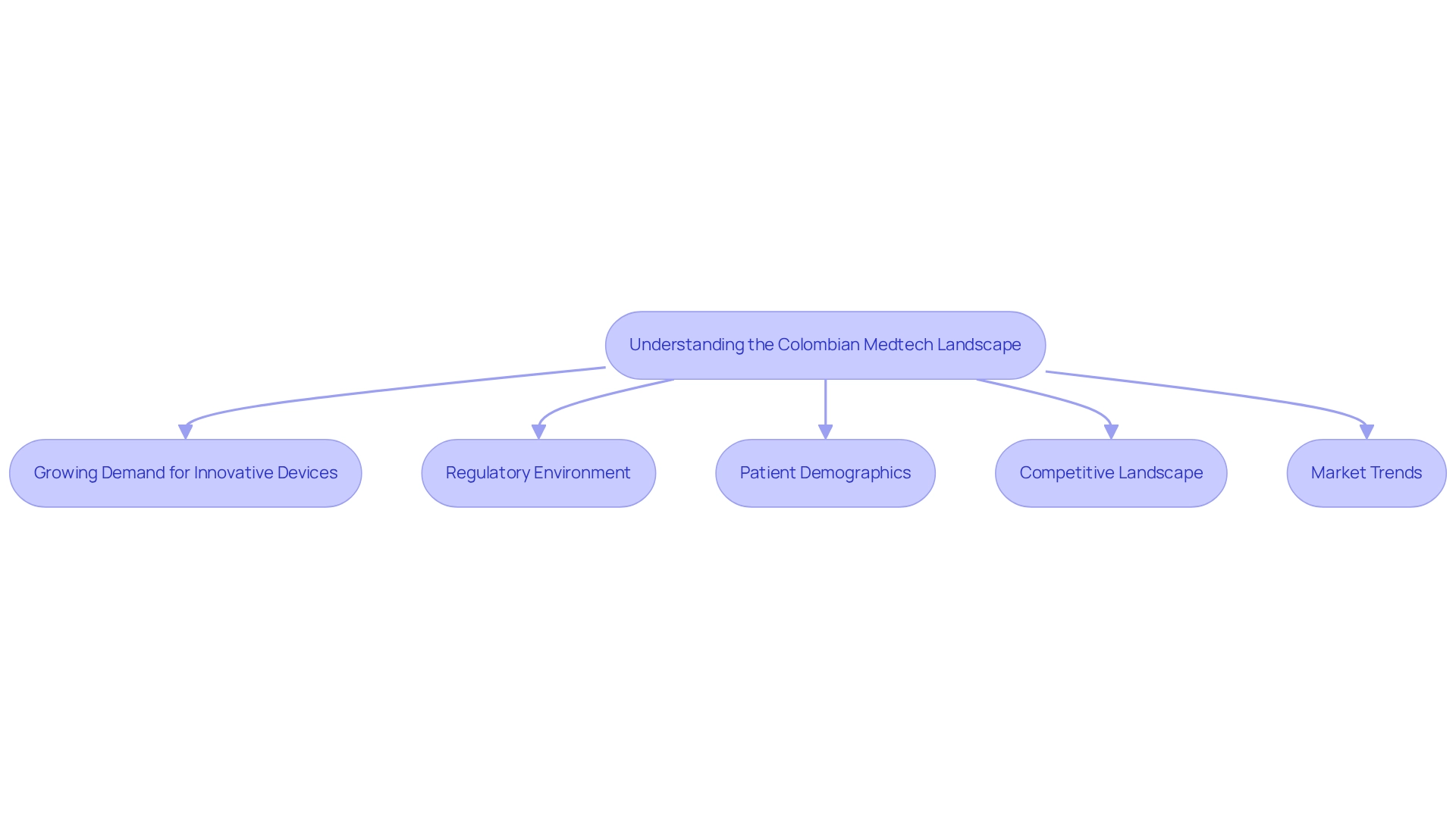
Navigating Regulatory Compliance in Colombia
Navigating the regulatory landscape in Colombia-specific medtech trial strategies requires a comprehensive understanding of the requirements established by the National Institute for Drug and Food Surveillance (INVIMA). Organizations must develop thorough documentation, including research protocols and informed consent forms, all of which must receive approval from local ethics committees. Notably, the approval process is efficient, typically taking around 30 days, which is relatively swift compared to other regions.
Adhering to Good Clinical Practice (GCP) guidelines is essential to avoid potential setbacks in the approval process. Bioaccess offers extensive management services for research studies, encompassing:
- Feasibility assessments
- Site selection
- Compliance evaluations
- Study setup
- Import permits
- Project management
- Reporting
This holistic approach ensures that all aspects of the research study align with current regulations and enhances the likelihood of a successful trial.
The outlook for Contract Research Organizations (CROs) in Latin America is promising, driven by technological advancements and a focus on patient-centric research methodologies. This growth corresponds with the Colombian government's active initiative to attract more clinical studies as part of its strategy to become a knowledge economy by 2031, as noted by Julio G. Martinez-Clark, CEO. Engaging with local regulatory specialists is strongly advised to improve the chances of a successful trial.
These professionals can provide invaluable insights into the intricacies of INVIMA's requirements, facilitating smoother interactions with the regulatory body. Their expertise is also beneficial in addressing any compliance issues that may arise during the trial.
Moreover, it is crucial to consider the challenges posed by the country's judicial system, which has faced criticism for being slow and bureaucratic. This context is particularly relevant for foreign companies navigating compliance and regulatory interactions. As Colombia continues to establish itself as a center for medical research, understanding Colombia-specific medtech trial strategies will be vital for Medtech firms looking to conduct studies in the region.
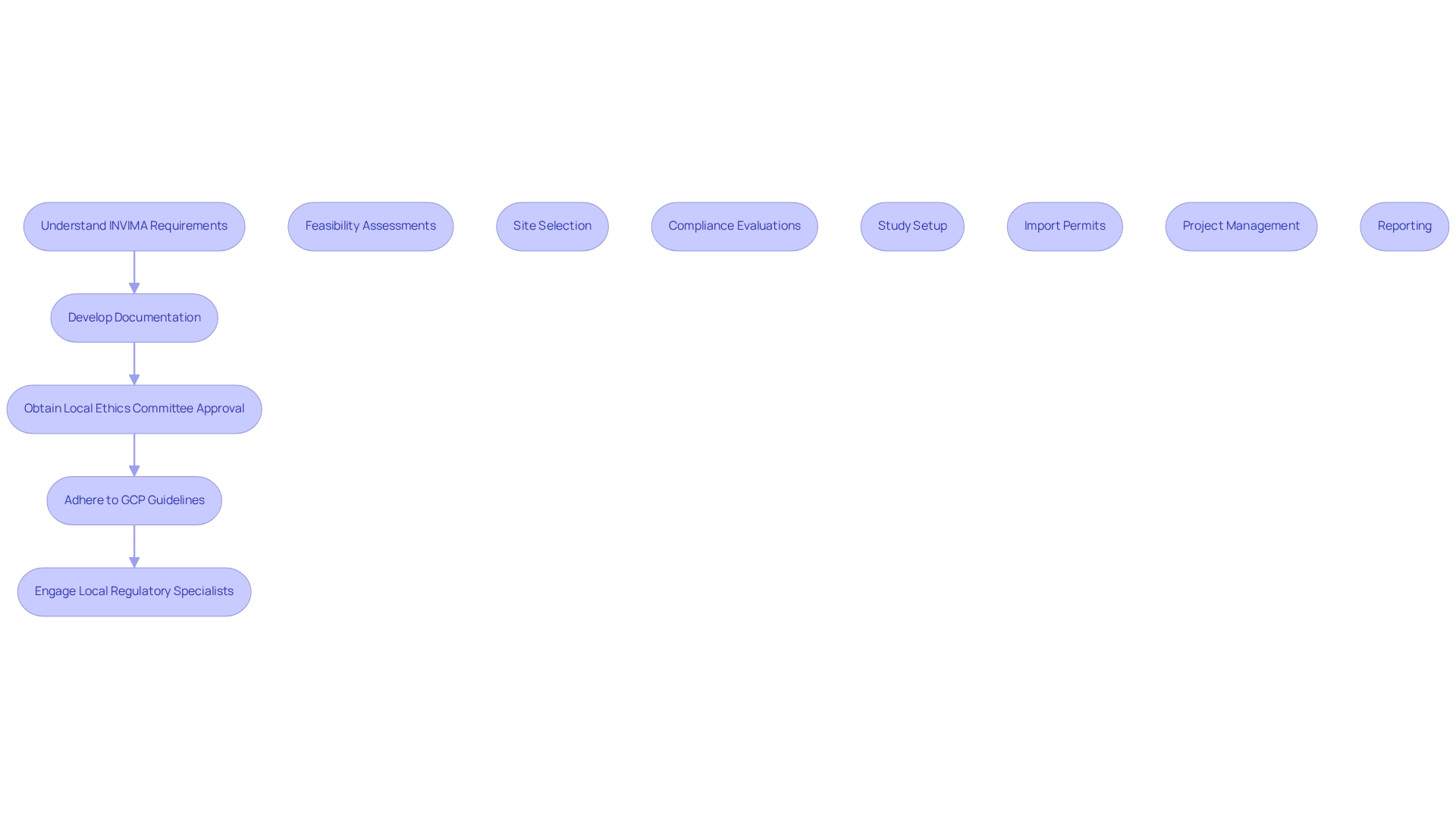
Effective Recruitment Strategies for Clinical Trials
Colombia-specific medtech trial strategies are crucial for the success of medical studies in Colombia. The country's large population, efficient regulatory processes, and esteemed research community render it an appealing option for U.S. medical device companies. To enhance outreach, companies should engage with regional networks, including healthcare providers and community organizations, significantly increasing awareness about ongoing studies. The partnership between bioaccess™ and Caribbean Health Group to establish Barranquilla as a premier location for medical studies in Latin America illustrates the potential of utilizing local collaborations.
Furthermore, the backing from Colombia's Minister of Health emphasizes the dedication to improving the research environment. The use of digital platforms and social media is particularly effective in reaching younger demographics, enhancing engagement and participation rates. Culturally sensitive materials that clearly articulate the benefits of participation and address potential concerns can further improve participant engagement. Providing rewards such as travel refunds or free health assessments can encourage individuals to participate in research studies.
As Max Baumann, Head of Execution, notes, "We expect continued focus on optimizing the development journeys of assets to achieve not only an approval-enabling endpoint but to qualify for commercial success." Building trust through clear communication about the procedure is crucial for promoting long-term participant dedication, ensuring that individuals feel informed and appreciated during their engagement.
Moreover, considering the anticipated expansion of Argentina's healthcare support services market, projected to reach USD 249.8 million by 2030, there is considerable potential for comparable growth in another South American nation. This highlights the significance of efficient hiring approaches in this changing environment, as firms such as GlobalCare Clinical Trials collaborate with bioaccess™ to improve ambulatory services in the region, achieving over a 50% decrease in recruitment duration and 95% retention rates. It is essential for companies to grasp regional market subtleties and regulatory procedures, as emphasized in the podcast, to customize their recruitment strategies efficiently and guarantee successful testing results by implementing Colombia-specific medtech trial strategies.
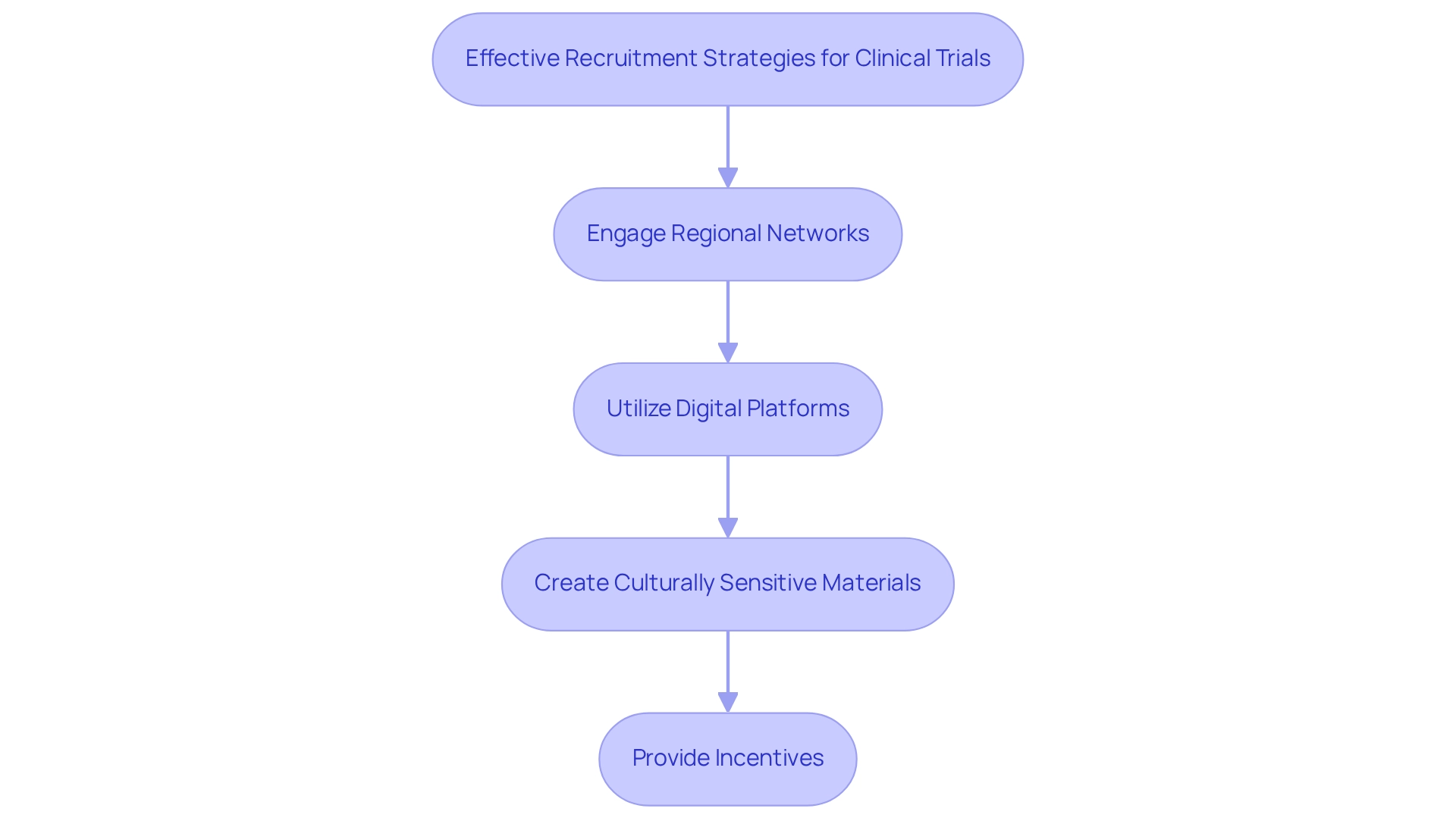
Building Partnerships with Local Stakeholders
Forming alliances with nearby stakeholders, such as hospitals, universities, and research institutions, is crucial for the success of Colombia-specific medtech trial strategies. These partnerships not only provide access to a diverse patient demographic but also significantly enhance the credibility of the studies. Engaging local investigators, who possess a profound understanding of the cultural and operational dynamics of the region, can lead to improved recruitment and retention rates—critical factors for the success of Colombia-specific medtech trial strategies.
A significant illustration of this cooperation is the alliance between bioaccess™ and Caribbean Health Group (CHG), announced on March 29, 2019. This partnership aims to establish Barranquilla as the premier location for medical research in Latin America. Supported by the nation's Minister of Health, Juan Pablo Uribe, this initiative underscores the government's commitment to enhancing the research environment in the country.
Moreover, fostering relationships with regulatory bodies is essential for implementing Colombia-specific medtech trial strategies, facilitating a more efficient navigation of the approval process. The regulatory framework, overseen by INVIMA, emphasizes the necessity of certified research facilities that can support these strategies, thereby expediting the commencement of studies. Consistent communication and collaboration with these stakeholders can promote resource and knowledge sharing, ultimately improving the overall efficiency and effectiveness of research studies.
The administration is diligently working to enhance the research setting to meet global benchmarks, positioning the country as a regional leader in medical studies.
Looking ahead to 2025, the landscape for partnerships in clinical studies in Colombia is expected to evolve, with a growing emphasis on collaboration. Statistics indicate that over 200,000 company profiles exist, reflecting the increasing awareness among biotechnology firms of the importance of regional partnerships. These partnerships can be further strengthened through Colombia-specific medtech trial strategies, leading to more successful outcomes. Insights from community stakeholders underscore the necessity of establishing trust and credibility through these collaborations, ensuring that Colombia-specific medtech trial strategies are not only compliant with regulations but also culturally relevant and accessible to the intended populations.
The role of regional investigators is vital in Colombia-specific medtech trial strategies; their involvement is often a decisive factor in the success of clinical research. As Dushyanth Surakanti, Founder & CEO of Sparta Biomedical, shared regarding his experience with bioaccess® during its initial human study in South America, leveraging regional expertise is essential for refining study strategies. Max Baumann, Head of Execution at Tree Hill Partners, remarked, "We expect continued focus on optimizing the development journeys of assets to achieve not only an approval-enabling endpoint but also to qualify for commercial success."
By harnessing the knowledge and connections of regional investigators, Medtech firms can enhance their testing strategies, particularly through Colombia-specific medtech trial strategies, ensuring alignment with both regulatory requirements and business objectives. Case studies from recent experiments in the country illustrate how successful collaborations have resulted in increased patient involvement and streamlined procedures, setting a benchmark for future endeavors in the field.
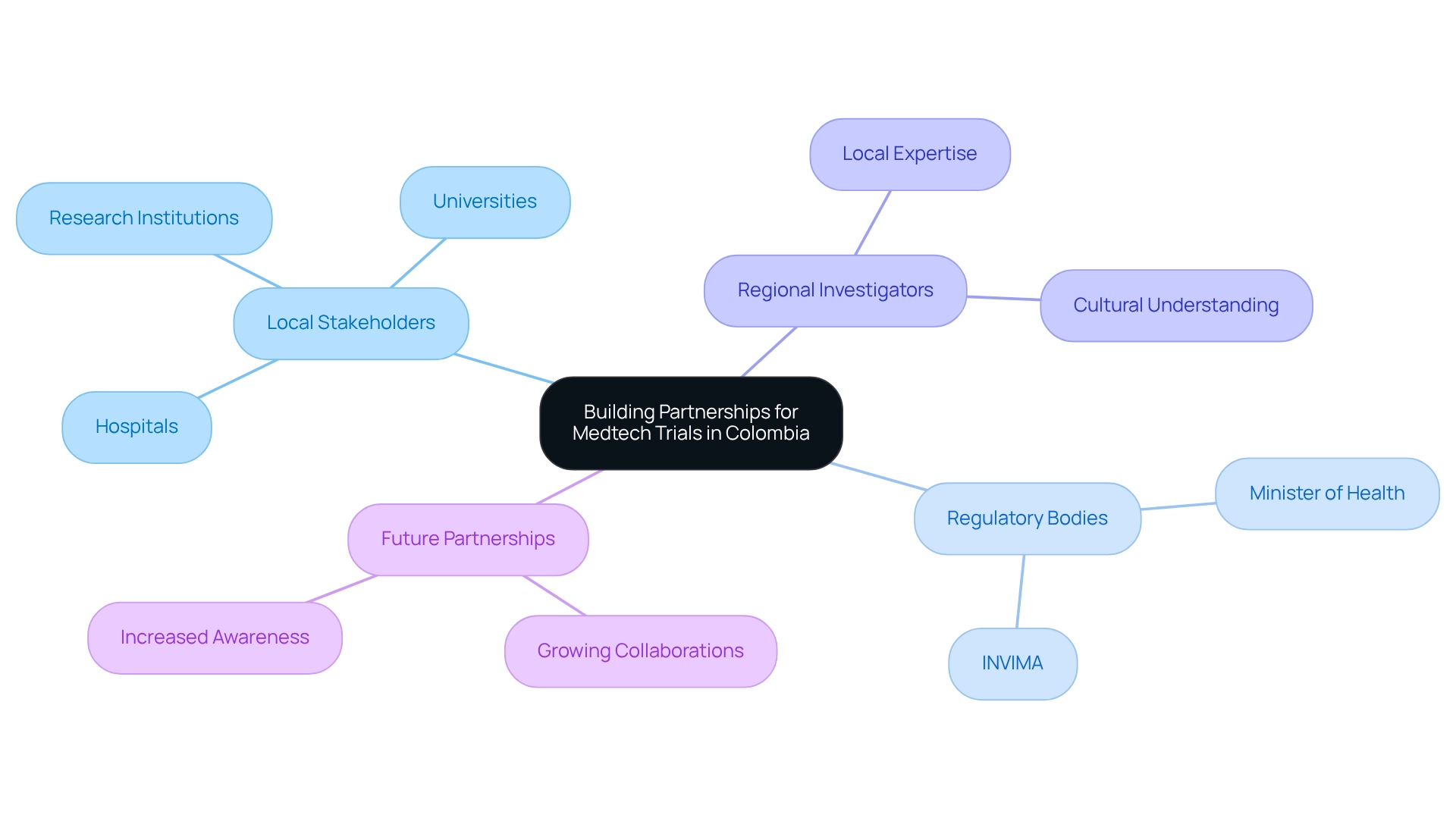
Customizing Clinical Research Approaches for Local Contexts
Tailoring Colombia-specific medtech trial strategies to the unique context of Colombia is essential for achieving significant results. A comprehensive understanding of cultural perspectives on healthcare and research studies is crucial, as these views can vary greatly across different regions. As highlighted in the LATAM Medtech Leaders Podcast, effective market access strategies often depend on regional expertise and the involvement of local specialists, including bioaccess, which plays a vital role in supporting medical studies throughout Latin America.
A recent study on game jam learning revealed an adjusted odds ratio of 2.09 for higher transcultural self-efficacy immediately following the intervention, underscoring the importance of cultural considerations in clinical research. Integrating regional languages into study materials not only enhances participant comprehension but also fosters increased engagement. Furthermore, modifying testing protocols to align with Colombia-specific medtech trial strategies can lead to improved adherence and superior data quality.
Engaging regional healthcare experts in the design and implementation of Colombia-specific medtech trial strategies offers invaluable perspectives that enhance the significance and applicability of research outcomes. Industry leaders emphasize that understanding these cultural nuances is essential for favorable results in research studies. This tailored approach not only respects cultural differences but also maximizes the potential for effective and impactful research in the region, as evidenced by ReGelTec's Early Feasibility Study on HYDRAFIL™ for treating chronic low back pain, which successfully engaged local patients and healthcare providers, supported by bioaccess's collaborative efforts.
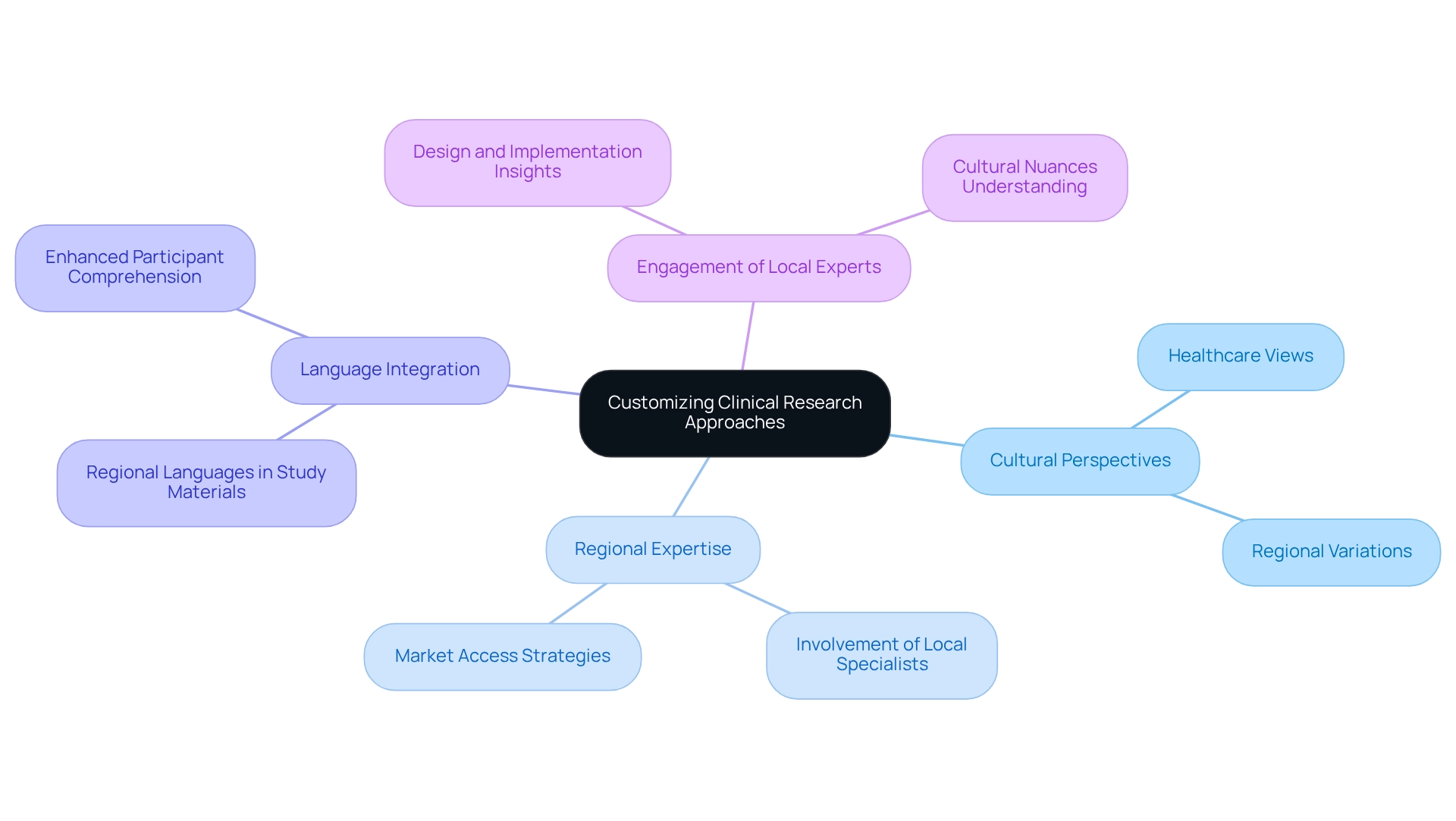
Leveraging Technology to Enhance Trial Efficiency
Utilizing technology is crucial for enhancing the effectiveness of clinical studies through Colombia-specific medtech trial strategies. Digital tools, particularly electronic data capture (EDC) systems, streamline data collection processes, significantly minimizing errors often associated with manual data entry. Moreover, mobile applications boost participant involvement by sending timely reminders for appointments and medication adherence, which is essential for ensuring compliance throughout the study.
Telemedicine emerges as a transformative solution, broadening access to participants, especially those in remote regions. This capability allows for more flexible study designs, accommodating diverse participant needs and circumstances. Furthermore, integrating data analytics facilitates real-time observation of progress, empowering researchers to make prompt modifications to protocols as necessary.
The impact of these technological developments is profound, resulting in not only more efficient tests but also enhanced participant experiences. Notably, medical procedures in Colombia can be 40%–75% lower than rates in the U.S., underscoring the cost-effectiveness of conducting research studies in the region. As Max Baumann, Head of Execution at Treehill Partners, observes, "Going into 2025, we still notice biotech confronting essential business model obstacles as end-markets become increasingly crowded."
This scenario highlights the imperative for Medtech companies to effectively leverage Colombia-specific medtech trial strategies. With over 20 years of experience in Medtech, bioaccess® aims to accelerate the enhancement of medical devices through their expertise and tailored approach, essential for navigating the complexities of research in Colombia. Their comprehensive healthcare study management services—including feasibility assessments, site selection, compliance evaluations, project oversight, and reporting—are designed to streamline the development process.
Additionally, the partnership between bioaccess® and Caribbean Health Group to establish Barranquilla as a leading location for research trials in Latin America, supported by the nation's Minister of Health, illustrates the potential for job creation and economic development in the region. Embracing these digital solutions will be vital for Medtech companies implementing Colombia-specific medtech trial strategies to thrive in this evolving landscape.
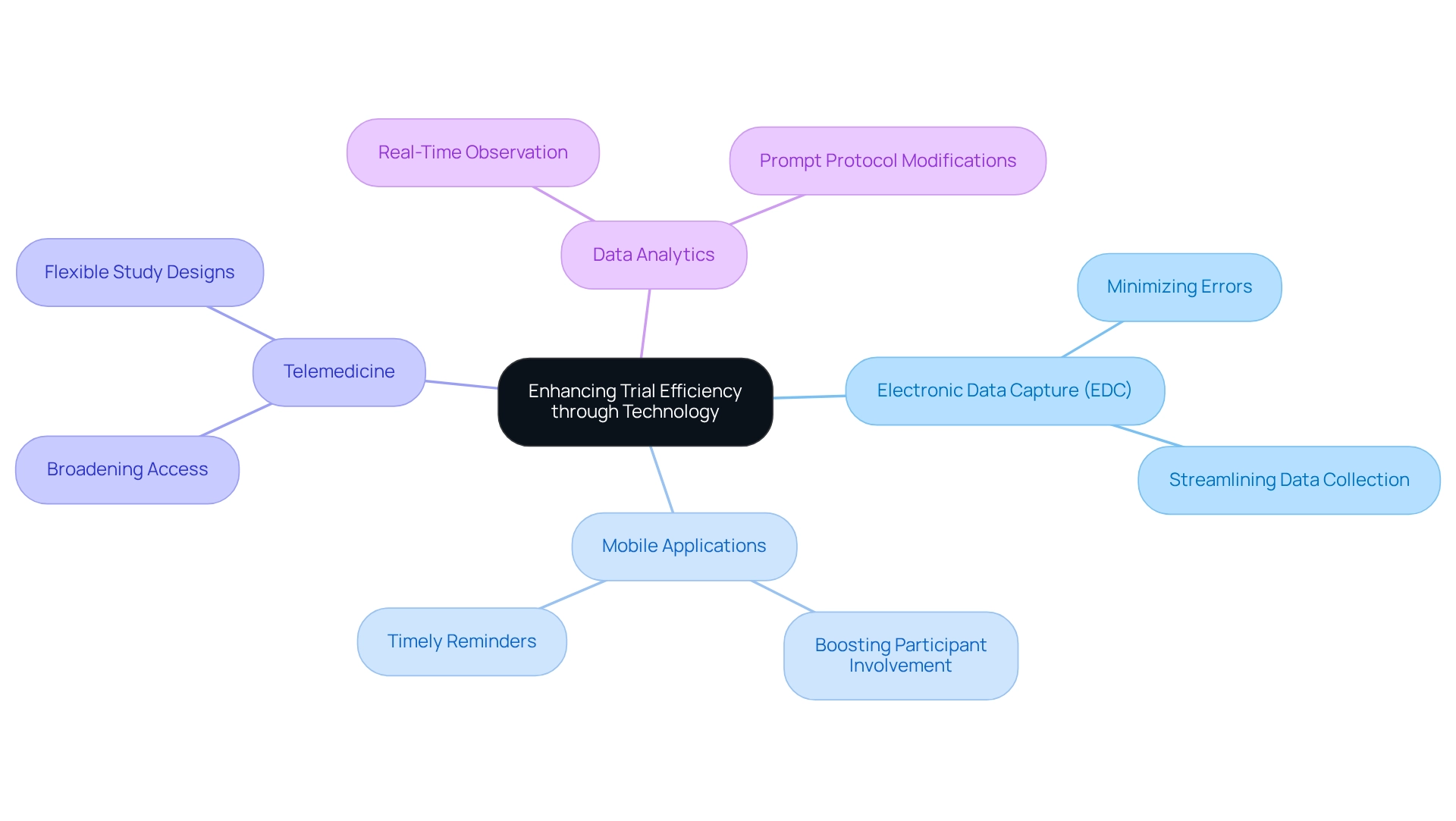
The Role of Post-Market Studies in Medtech Success
Post-market studies are pivotal for the success of Medtech products, offering crucial insights into the safety and effectiveness of devices following their market launch. In Colombia, regulatory frameworks mandate that manufacturers conduct post-market clinical follow-up (PMCF) studies to evaluate device performance in real-world settings. These studies are instrumental in identifying potential long-term issues and facilitating the continuous improvement of medical devices.
Favorable government policies and investments in healthcare infrastructure have fostered the growth of the Medical Technology market in Colombia, creating a conducive environment for these studies.
A notable example is ReGelTec's Early Feasibility Study on HYDRAFIL™, which successfully treated eleven patients suffering from chronic low back pain in Barranquilla. This research not only demonstrates the efficacy of innovative therapies but also highlights the collaborative efforts between bioaccess™ and Caribbean Health Group to position Barranquilla as a prominent hub for medical studies in Latin America, with support from the nation's Minister of Health. Furthermore, GlobalCare Clinical Studies' partnership with bioaccess™ has enhanced ambulatory services in Colombia, achieving over a 50% reduction in recruitment time and 95% retention rates, underscoring the effectiveness of these initiatives.
The HYDRAFIL™ treatment entails melting a patented hydrogel prior to its injection into the nucleus of a degenerated disc using a 17-gauge needle, which is essential for comprehending the treatment's application. By actively engaging healthcare professionals and patients during these evaluations, companies can collect invaluable feedback that informs future product developments and enhances patient safety. Ensuring information security and client trust is paramount, and bioaccess® is dedicated to data protection in medical device clinical trials.
Their grievance and data protection procedures guarantee that client concerns are addressed with compliance and transparency, fostering trust among stakeholders. For any inquiries or concerns regarding data protection, clients may contact the Grievance Officer at IMH ASSETS CORP (doing business as "bioaccess®"), 1200 Brickell Avenue, Suite 1950 #1034, email: info@bioaccessla.com. As noted by MarkWide Research, "their reports are thorough, accurate, and delivered on time," emphasizing the significance of market insights for informed decision-making in post-market studies.
Prioritizing post-market studies and implementing Colombia-specific medtech trial strategies not only builds trust among stakeholders but also ensures compliance with regulatory standards, ultimately contributing to the sustained success of Medtech innovations in the Colombian market. The case study of Mark Wide Research illustrates how comprehensive market research can assist companies in making informed decisions regarding post-market studies, enhancing the practical relevance of this discussion.
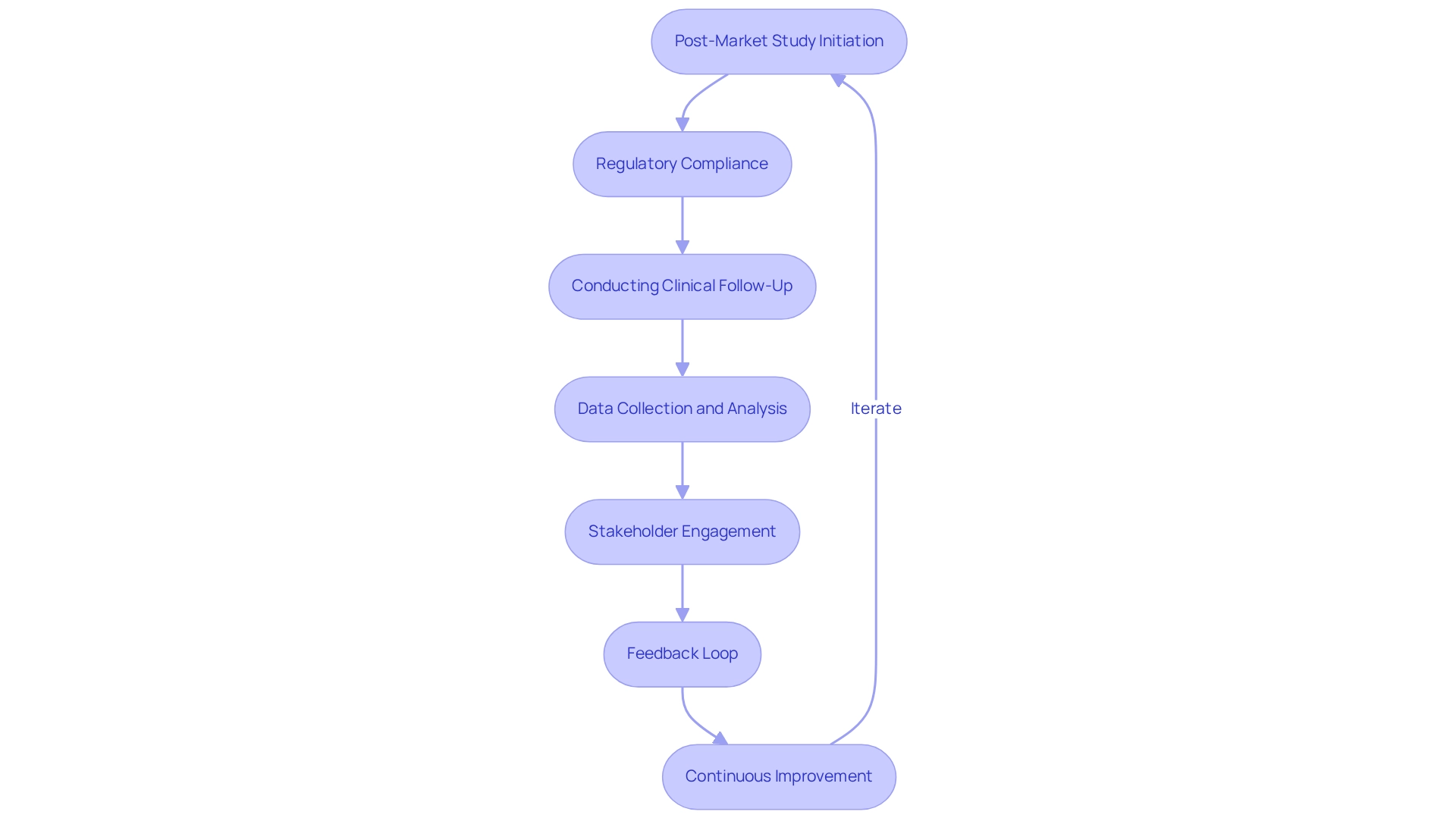
Conclusion
The Colombian Medtech sector stands on the brink of substantial growth, fueled by favorable regulatory conditions, a diverse patient population, and an increasing demand for innovative medical devices. For companies aiming to navigate this evolving landscape effectively, a thorough understanding of local market dynamics and regulatory compliance is crucial. With healthcare spending and the medical device market projected to expand, organizations that strategically position themselves within this framework are poised to reap significant benefits.
Forging strong partnerships with local stakeholders, including hospitals and research institutions, bolsters the credibility and feasibility of clinical trials. By harnessing local expertise and cultural insights, companies can refine recruitment strategies and enhance trial outcomes. The integration of technology further streamlines processes, ensuring that clinical trials are not only efficient but also adaptable to participant needs.
Furthermore, the focus on post-market studies underscores the necessity of continuous evaluation to ensure the safety and efficacy of medical devices. By actively engaging with healthcare professionals and patients, companies can gather essential feedback that informs future innovations. Ultimately, Colombia's Medtech ecosystem presents considerable opportunities for growth and collaboration, positioning it as a leader in Latin America's healthcare landscape. Embracing these opportunities with a tailored approach will be pivotal in capitalizing on the potential this dynamic market offers.
Frequently Asked Questions
What is driving the transformation of Colombia's Medtech landscape?
The transformation is driven by a growing demand for innovative medical devices and a regulatory environment that fosters growth, making Colombia a strategic hub for medical studies.
Why is Colombia considered a strategic hub for medical studies?
Colombia is seen as a strategic hub due to its diverse patient demographics, cost-effective research capabilities, and a regulatory framework that encourages foreign investment.
What is the projected growth of the Colombian medical device market by 2025?
The Colombian medical device market is projected to expand significantly, reflecting a broader trend in Latin America, with Argentina being the fastest-growing market.
How does understanding regional market dynamics benefit Medtech firms?
It allows Medtech firms to implement Colombia-specific trial strategies effectively by assessing the competitive landscape, which includes both local companies and global entities.
What are the key trends in Colombia's Medtech landscape?
Key trends emphasize patient-centric solutions and the integration of advanced technologies in medical research.
What is the expected growth of the medical device Regulatory Affairs market in Colombia?
The medical device Regulatory Affairs market is anticipated to grow from USD 25.7 million in 2024 to USD 44.2 million by 2030, with a CAGR of 9.5% from 2025 to 2030.
What role does patient demographics play in medical research strategies?
A well-represented patient population can enhance the reliability and applicability of study outcomes, making it crucial for shaping research strategies.
What services does Bioaccess® provide for trial management?
Bioaccess® offers comprehensive trial management services, including compliance reviews, project management, feasibility assessments, site selection, and reporting.
What is the approval process for Medtech trials in Colombia?
The approval process requires thorough documentation and approval from local ethics committees, typically taking around 30 days, which is considered efficient compared to other regions.
What challenges might foreign companies face when navigating Colombia's regulatory landscape?
Foreign companies may encounter challenges related to the slow and bureaucratic judicial system, which can complicate compliance and regulatory interactions.
Why is engaging with local regulatory specialists recommended?
Local regulatory specialists can provide valuable insights into INVIMA's requirements and help address compliance issues, improving the chances of a successful trial.
What is the outlook for Contract Research Organizations (CROs) in Latin America?
The outlook is promising, driven by technological advancements and a focus on patient-centric research methodologies, aligning with the Colombian government's initiative to attract more clinical studies.

